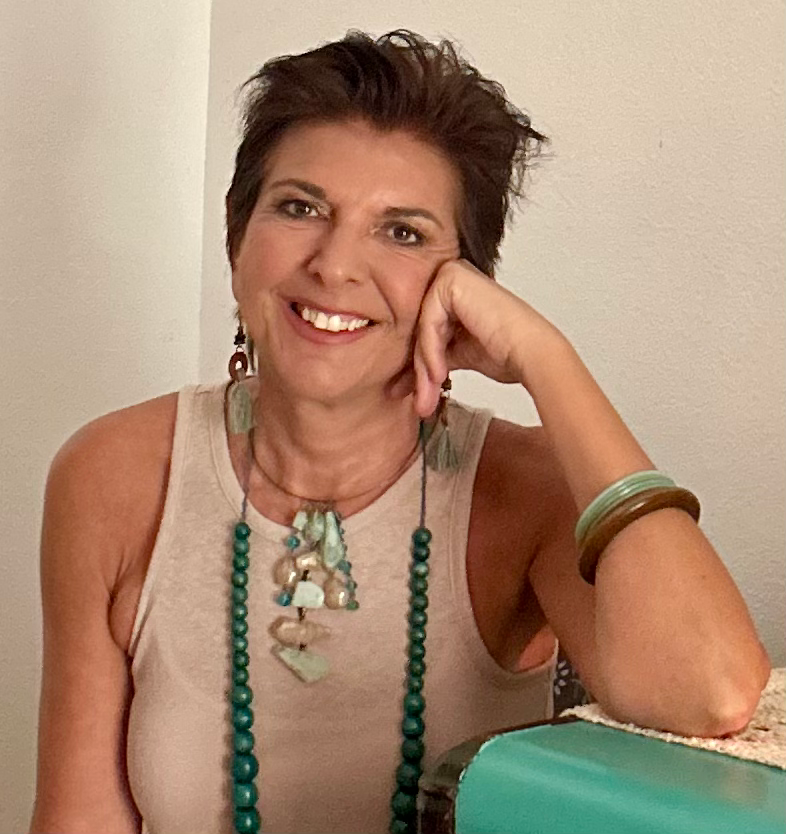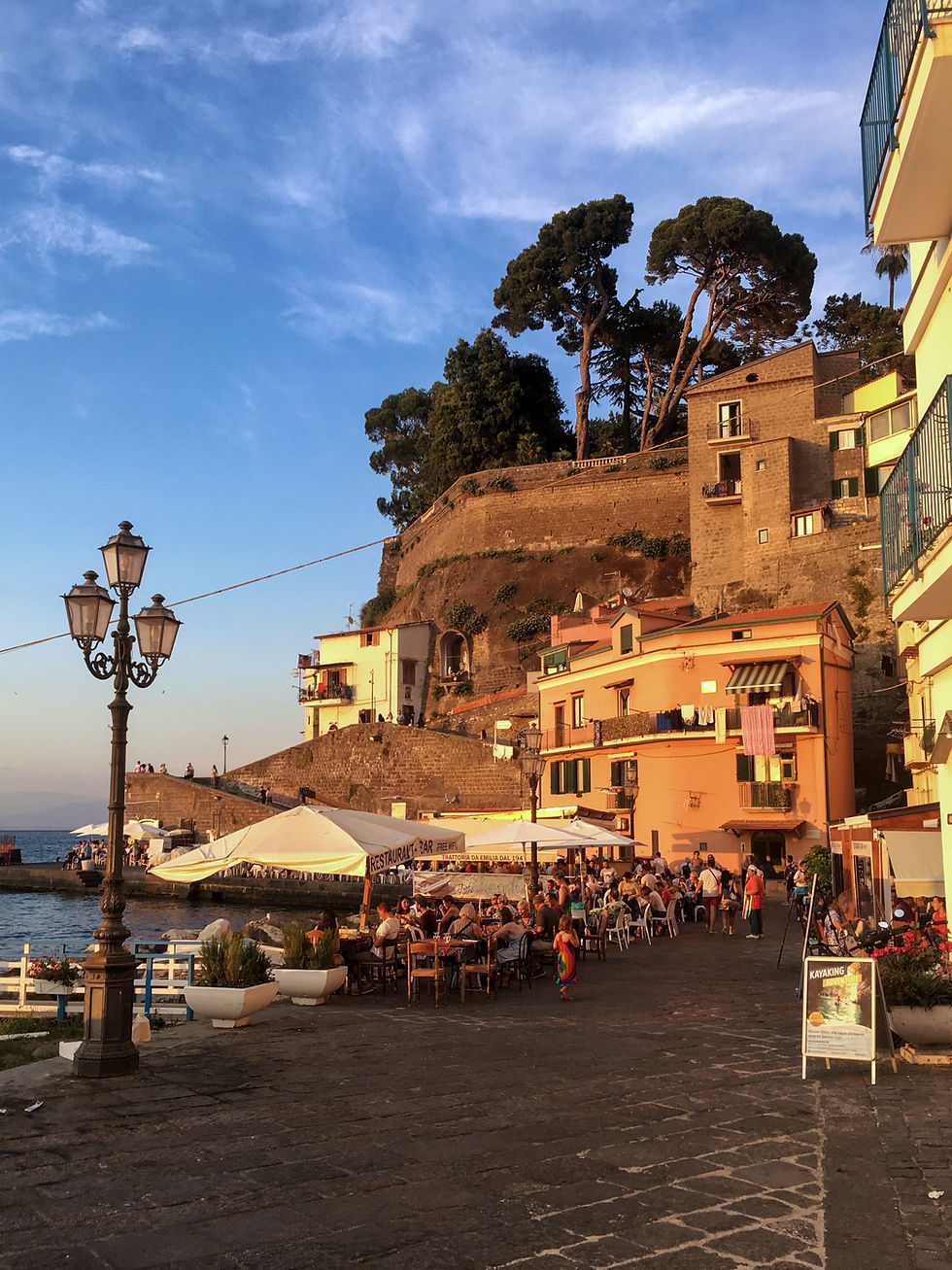Buried at Sea
- Isabella Campolattaro

- May 16, 2022
- 6 min read
Updated: May 26, 2022
Dear Readers: This is a fictionalized tribute to my father who died 22 years ago, a big departure from my usual posts. I just got back from a week-long trip to Italy for my cousin's daughter's wedding and seized the opportunity to scatter Papà's ashes in the Gulf of Naples at Sorrento. I'd actually gone to Italy immediately following his death to do just that way back when, but chickened out when his brother, my Zio (the grandfather of the bride, replaced in this account by an aunt), was outraged at the thought of my dad's cremation. I hope you'll enjoy the blog.
___

Somewhere in the Bay of Naples there's a mason jar containing a few Vesuvian rocks and the ashes of my father…
The jar—a salvaged vessel from my zia's marinated eggplants which I consumed last night in honor of Papà—may not be weighted enough by the porous volcanic rocks to prevent the jar from bobbing on this wedge of the Mediterranean Sea for eternity. No matter. I’m sure my father would like to ride these waves indefinitely.
I couldn’t bring myself to scatter the ashes promptly as originally planned. Given my ambivalence, Zia's mournful glare when I announced my intention to do just that cemented my decision. If she’d know what I was now doing instead, she’d be even less pleased. Still, the notion of my father resting in this place somewhat intact is easier to bear than him being gone forever, dissolved in the briny sea.

I came here two weeks ago with this explicit task in mind: Return Papà to this beautiful but morally ambiguous place. Reunite him with these streets, all swaying hips and criminally irreverent swagger, tempered by an unguarded earnestness that borders on nobility. Surrender him to his native waters, literally and figuratively.

Zia's silent objection enabled me to procrastinate, distracting me from my mission by joining the tempo of the busy city around me, running errands, helping Zia nanny two small children, and embracing the routine of a native.
But this morning I woke with a conviction I tried hard to ignore. I made it as far as the threshold of Zia's building when the click of the portone shutting behind me reminded me of what I’d come to do. I let myself back in through the heavy oak door and climbed the steep, narrow flight of stone steps to the miniscule flat, the very flat where my father was born.
I took the small, oddly commercial-looking box of my father’s ashes from the top of the dresser and brought them ceremoniously to the kitchen table, stared at them in the striped light streaming through the slats of the closed balcony shutters. I prayed aloud, “God, help me do this.”

I remembered the simple glass jar in the kitchen sink. I’d eaten the marinated eggplants late last night, recalling the ridiculously swaddled shipments my father used to receive in America with condescending amusement.
“My sister is a fool to send me these,” he chortled in his heavily accented baritone.
Later though, he would serve them with solemn reverence that betrayed his ridicule, spooning them onto heavy white porcelain plates with eucharistic adoration, then savoring each bite, telling us in exquisite detail how the eggplant was prepared.
I held the jar under a steaming stream of the hottest water I could bear, watching the soapy bubbles disappear. I turned the water off and dried the jar with a towel hanging on the clothesline just outside the small kitchen window overlooking the narrow street. Returning to the kitchen table, I opened the box of ashes and poured the contents into the jar, using a piece of butcher’s paper shaped into a funnel. I gently placed the jar into my satchel and headed out.

I stepped into the noisy street, and made my way toward Via Roma, a noisy shop-lined urban artery. At one of dozens of ancient crossroads, I turned left toward the Golfo di Napoli, I hoped, since I was never quite certain where these tangles would lead. In these claustrophobic streets, buffeted by bygone buildings and laundry lines, the sounds of the busy city are muffled, and one can only hear fragments of sounds escaping from nearby windows and doorways. I passed a little boy happily kicking a soccer ball, mumbling joyful nonsense to himself.
Suddenly, a wave of grief sweeps over me. I see my father as this child, innocent. His heart and mind a pitcher waiting to be filled with the sweet wine of love but filled instead with the foul brine of rejection. His father, my nonno, a musician who was once first violinist at the San Carlo, was rancorous at his empty pockets, unwanted wedding, and the inconvenience of an untimely son. My nonna, a mother martyred into sacrificing even her most basic desires to an ungrateful husband and eventually, a brood of appetites, handed her first born to a barren sister to raise.
From a child's viewpoint, surely this would seem a rarely seen poverty of parental love in a place where familial affection is oxygen. The incongruity must have planted a painful seed. And yet that seed grew into the fight, flight, and ambition that fueled my father’s ascent up and beyond these ancient walls, propelled by his adoring adoptive mother. Eventually, to the promise of America.

Now, as I pass the giornalaio languidly reading the morning paper he sells, only pausing to leer at me, I fight the faint disdain that must have been in my father’s diligent heart growing up in this lascivious life. Yet, what I know he once viewed as marrow-deep laziness of his people seems more like profound wisdom. After all, weren’t these the very people that had once ruled the world? Now they reveled in the simpler pleasures of life, creating and treasuring beauty in all its forms.
During his lifetime, my father’s brilliance didn't illuminate the truth of this timeless paradox: Everything material that we gain under our own steam, is traded for something more fulfilling and enduring. King Solomon reflected,
Yet when I surveyed all that my
hands had done
and what I had toiled to achieve,
everything was meaningless, a chasing after the wind;
nothing was gained under the sun.
(Ecclesiastes 2:11)
My father pursued the empty and insatiable pleasure of achievement at a price so dear one couldn’t bear to count it.

Returning to my mission, I make a detour past the Castel Nuovo to delay and delay some more, zigzagging here and there, elongating my route to the waterfront.
I dodge the honking mad traffic near Piazza Plebiscito to reach the last island between me and the water, which will soon be teeming with tourists buying gelati and postcards.
The heavily traveled, waterside Via Caracciolo veers off sharply just before this place. Clamoring fishermen, whose boats are normally docked nearby, have already left for the day’s work. It is surprisingly quiet. In the silence, I realize I’m not ready.

I sit on the stone seawall, my back to the bay. I see myself in the mirror of this famous panorama. The swarthy, visceral, open faces laughing or crying with equal fervor and frequency at life’s caprices. Even those faces more composed by education or breeding belie their essence with little provocation. Forty years in America hadn’t erased it from my father’s face either.

When news of my father’s death first reached me, the pulsing vein responded first—drama, tears and choking sobs. Then nothing. No textbook stages of grief. Just an empty place as though he’d never been. But he had. Here I stand as proof. Not merely offspring, but a technicolor, jumbled version of him which has at times threatened to overwhelm me and others.
Yet I am redeemed, beloved, and accepted as I am.
I examine the traces of prehistoric bitterness like a dangerous foreign object. I know how perilous it can be to dwell in this nasty place of relived recriminations, as tempting as it can be to feel self-righteous.
Tempted by the acrid taste of judgment, I’m quickly reminded of the condemnation that awaits me if my own sins were laid bare. It’s time to reconcile.
I step down onto the dark flat stones which in the summer serve as a perch for eager sunbathers. The water laps at my feet. I pause, look heavenward and say a silent prayer. I pull the jar from my bag and cast it with all my might. “You’re home again,” I say aloud.

I turn and rush to the shore, my breath fast and hard, almost panicked. I don’t feel the comfort, conviction, or closure I’d hoped for. With my father goes a vein of wildness in my own life that may best be renounced but is so hard to surrender. He died too early and sadly, alone with an uncorked bottle and an overturned glass; the fate that might have befallen me, saved only by grace. Why don’t I feel free?
A pang of regret grips me. I run back to the spot I left just moments before. The jar is bobbing in a foamy eddy. As I reach to reclaim it, a small, dense wave crushes it against the rocks at my feet and it shatters. The contents vanish almost instantly, absorbed by the warm sea.
I sigh with relief.
If you enjoy my writing, would you please consider a gift? Your support makes all the difference! No gift is too small. Please like, comment, and share my blogs, too.






Thanks, friend. 😘
Bellisimo